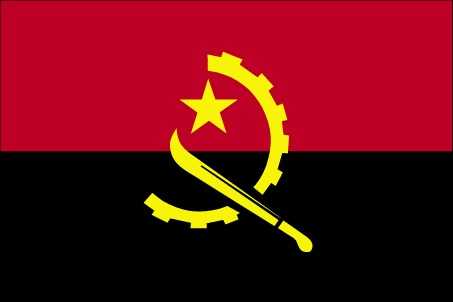Introduction
Background
Angola was the site of multiple kingdoms through the mid-19th century, the most prominent being the Kongo and Ndongo. In the 16th century, Portugal began establishing a colony. Angola gained independence from Portugal in 1975. A 27-year civil war ended in 2002.
Geography
Area
total : 1,246,700 sq km
land: 1,246,700 sq km
water: 0 sq km
Climate
semiarid in south and along coast to Luanda; north has cool, dry season (May to October) and hot, rainy season (November to April)
Natural resources
petroleum, diamonds, iron ore, phosphates, copper, feldspar, gold, bauxite, uranium
People and Society
Population
total: 37,202,061
Ethnic groups
Ovimbundu 37%, Kimbundu 25%, Bakongo 13%, Mestico (mixed European and native African) 2%, European 1%, other 22%
Languages
Portuguese 71.2% (official), Umbundu 23%, Kikongo 8.2%, Kimbundu 7.8%, Chokwe 6.5%, Nhaneca 3.4%, Nganguela 3.1%, Fiote 2.4%, Kwanhama 2.3%, Muhumbi 2.1%, Luvale 1%, other 3.6% (2014 est.)
Religions
Roman Catholic 41.1%, Protestant 38.1%, other 8.6%, none 12.3% (2014 est.)
Population growth rate
3.33% (2024 est.)
Government
Government type
presidential republic
Capital
name: Luanda
Executive branch
chief of state: President Joao Manuel Goncalves LOURENCO (since 26 September 2017)
head of government: President Joao Manuel Goncalves LOURENCO
Legislative branch
summary: unicameral National Assembly (220 seats)
Diplomatic representation in the US
chief of mission: Ambassador Agostinho de Carvalho dos Santos VAN-DÚNEM (since 30 June 2023)
Diplomatic representation from the US
chief of mission: Ambassador Tulinabo S. MUSHINGI (since 9 March 2022)
Economy
Economic overview
middle-income, oil-dependent African economy; widespread poverty; rising inflation and currency depreciation; seeking diversification through agricultural production; significant corruption in public institutions; major infrastructure investments from China and US; exited OPEC in 2023
Real GDP (purchasing power parity)
$265.868 billion (2023 est.)
$263.611 billion (2022 est.)
$255.821 billion (2021 est.)
Real GDP per capita
$7,200 (2023 est.)
$7,400 (2022 est.)
$7,400 (2021 est.)
Exports
$36.961 billion (2023 est.)
$50.12 billion (2022 est.)
$33.675 billion (2021 est.)
Exports - partners
China 40%, India 9%, Netherlands 7%, France 7%, UAE 7% (2022)
Exports - commodities
crude petroleum, natural gas, diamonds, ships, refined petroleum (2022)
Imports
$23.676 billion (2023 est.)
$28.564 billion (2022 est.)
$18.845 billion (2021 est.)
Imports - partners
China 24%, Portugal 10%, Netherlands 8%, UAE 5%, India 4% (2022)
Imports - commodities
refined petroleum, wheat, cars, poultry, palm oil (2022)
Page last updated: Tuesday, August 27, 2024




